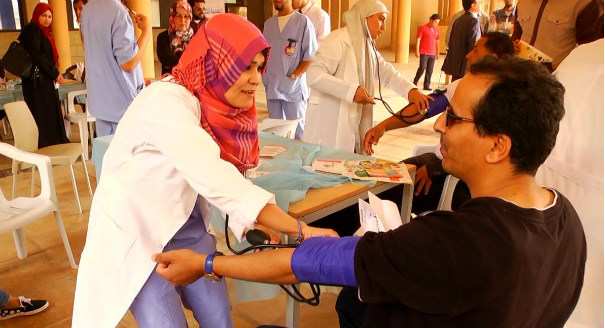

















Since fighting broke out in Benghazi in May 2014, health services in the city have been significantly affected. Most of the city’s hospitals are located in areas where there have been clashes, and the remaining hospitals have been drained of medical resources and equipment. According to the Minister of Health, Rida El Oakley, about sixty percent of the city’s hospitals have been forced to close since the start of clashes, and the rest are unable to respond to the needs of the city’s population.
“Missiles and rockets have become part of our daily work in the hospital,” said Dr. Salem Lanqi, as he inspected a barrier of sandbags erected by workers at Benghazi Medical Center in order to avoid the barrage of bullets coming from a nearby battle line. Benghazi Medical Center is the largest health facility in eastern Libya and has become the main hospital in the city after most of Benghazi’s other hospitals. Lanqi added that the center is not equipped to operate in a war zone, as it has only 260 beds. This number is insufficient to accommodate the dozens of people injured in clashes every day, not to mention the usual patients undergoing regular treatment at the hospital.
The situation is further exacerbated by the departure of most foreign medical personnel, who made up the backbone of workers in the hospitals. For more than a year, foreign embassies have called on their nationals to leave the country due to the worsening security situation. A catastrophe for the center, as foreign workers used to make up 90 percent of its staff. Lanqi notes that many local doctors and nurses are also unable to work. According to him, they have either left the city or are afraid to go to the hospital due to the security situation—especially after a number of workers were injured in the center on May 9, when the building was targeted by shelling and bullets.
“The security situation is now even worse than what we saw during the Libyan Revolution four years ago,” said Leon Tombo, a Philippine national and a nurse in the emergency room of the Benghazi Medical Center, in May 2015. He added, “I will resign at the end of this month, and many of my colleagues have already left. We are no longer safe inside the hospital; bombs and bullets are hitting the building, and a number of my colleagues have been injured in these attacks.” The conflict has also placed financial strains on foreign workers, Tombo explains, “Our families are also very angry because we have not been able to send them money from our salaries for more than a year, due to restrictions banks have put on money transfers. They are in dire need of this money, and it’s what pushed us to work [here] in the first place.… The value of the Libyan dinar against the U.S. dollar has collapsed. This means our salaries are not as good as they used to be, especially since we transfer money in U.S. dollars, and we’ve had no salary increase in five years.”
Because of the departure of foreign medical staff, doctors in Benghazi are trying to avert a health disaster by training medical students to replace the foreign nurses in the city’s hospitals. Essa al-Dinaa, a doctor at the Benghazi Medical Center, said, “We appealed to medical students in Benghazi to volunteer and work as nurses in the hospitals. We were surprised by the number of local students who responded to our call—we now have more than 600 volunteers.” He added, “We formed an academic committee of doctors to train large groups of 40 volunteers each. We will distribute them among the remaining hospitals in the city and they will form the backbone of workers in the hospitals in the event that all foreign nurses leave [the country].” Dinaa continued, “This is a new experiment and there are many warnings and red lines we have set for volunteers in nursing. We realize that volunteers will not have the same proficiency as those who have graduated from nursing schools, but we are training them on nursing skills, and their job will be to help nurses employed at the hospital.” But the volunteers are unpaid, and though many say they will continue to work in the hospitals until the conflict is over and foreign medical staff return, doctors are uncertain how long this approach can last.
Yet most hospitals still struggle to provide adequate medical services required for a war zone. Making matters worse, though the World Health Organization warned of a health crisis in Benghazi, international relief organizations with war zone experience—such as the International Committee of the Red Cross and the International Medical Corps—have left Libya because of the security situation.
This article was translated from Arabic.
Abdul Hakeam al-Yamany is a Libya-based journalist.






